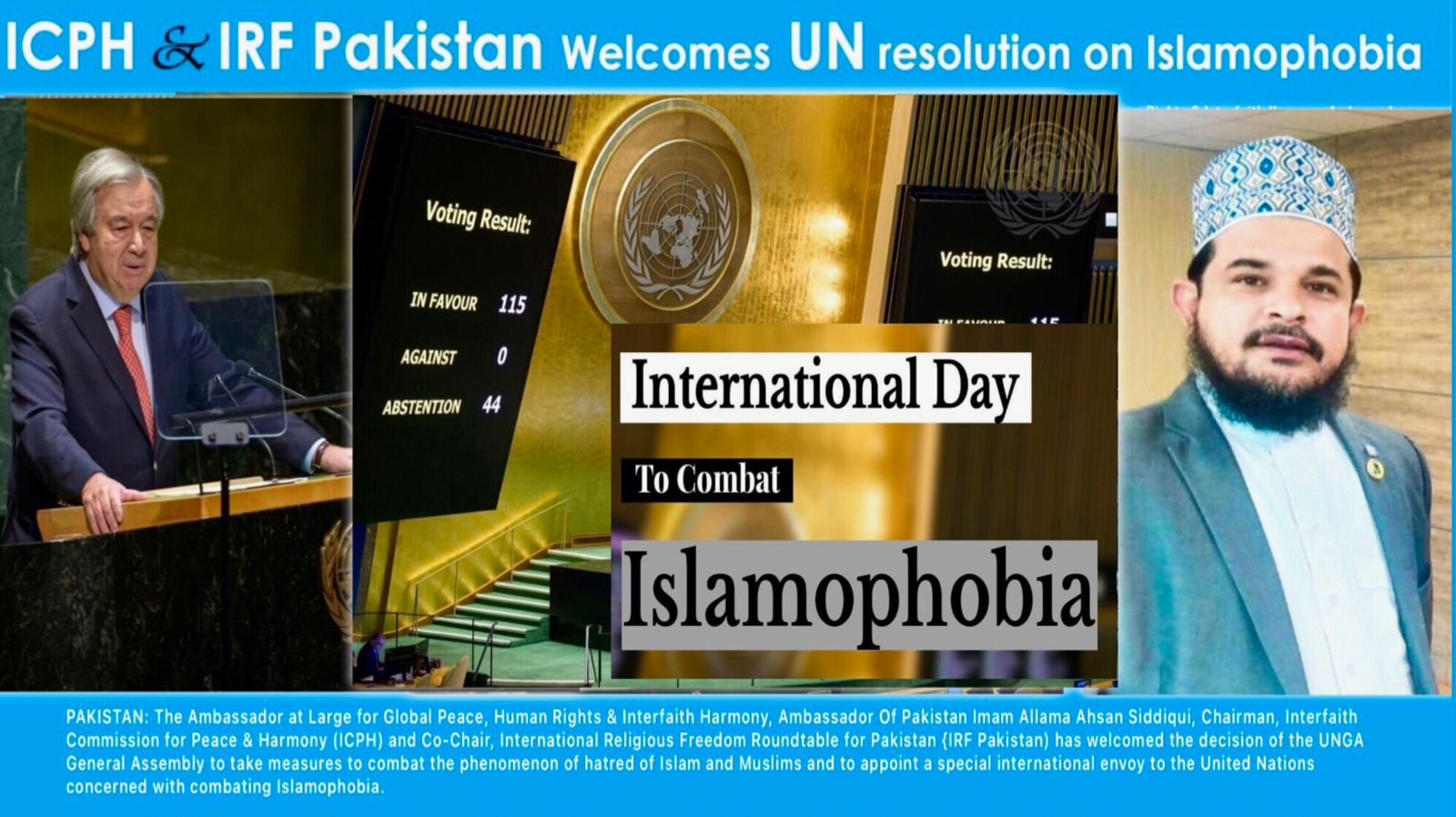This resolution coincides with the second anniversary of the United Nations’ adoption of March 15 as the International Day To Combat Islamophobia .
PAKISTAN: We welcome the resolution issued by the UN to adopt a follow-up resolution by the United Nations General Assembly to combat Islamophobia by a majority of 115 votes. The Ambassador at Large for Global Peace, Human Rights & Interfaith Harmony, Ambassador Of Pakistan Imam Allama Ahsan Siddiqui, Chairman, Interfaith Commission for Peace & Harmony (ICPH) and Co-Chair, International Religious Freedom Roundtable for Pakistan {IRF Pakistan) has welcomed the decision of the UNGA General Assembly to take measures to combat the phenomenon of hatred of Islam and Muslims and to appoint a special international envoy to the United Nations concerned with combating Islamophobia.
The United Nations General Assembly adopted a resolution on Friday, presented by Pakistan on behalf of the Organization of Islamic Cooperation (OIC), calling for measures to combat Islamophobia that it said regularly manifests itself at both societal and state levels. The resolution Titled “Measures to Combat Islamophobia,” the resolution was presented by Pakistan on behalf of the Organisation of Islamic Cooperation (OIC). Pakistan’s chief diplomat at the UN, Ambassador Munir Akram, introduced the follow-up resolution, emphasizing that Muslims globally continued to encounter significant discrimination, despite international acknowledgment of Islamophobia’s prevalence. Widespread negative representations of islam and harmful stereotypes that depict Muslims and their beliefs and culture as a threat have served to perpetuate, validate and normalize discrimination, hostility and violence towards Muslim individuals and communities.
Ambassador Imam Allama Ahsan Siddiqui said that on this the International Day to Combat Islamophobia we as an organization condemned the hatred and discrimination Muslims face worldwide. He said that a recent report by the special rapporteur on freedom of religion or belief found that suspicion, discrimination and outright hatred towards Muslims has risen to ‘epidemic proportions. We, the interfaith commission for Peace & Harmony (ICPH) and International Religious Freedom Roundtable Pakistan ( IRF Pakistan) believe that terrorism and violent extremism cannot and should not be associated with any religion, nationality, civilization, or ethnic group. He said that’s we call for a global dialogue on the promotion of a culture of tolerance and peace, based on respect for human rights and for the diversity of religions and belief.
We are committed to continuing to advocate for religious freedom religious harmony, love connection, interfaith harmony like the one we worked on in our Communities Combatting Hate coalition, ICPH 2907, that improve the gathering and reporting of hate and discrimination data. He said that the resolution called for concerted action to fight ongoing violence against Muslims. The UN resolution condemns any advocacy of religious hatred that constitutes incitement to discrimination, hostility or violence. It particularly condemns the incitement to discrimination, hostility or violence against Muslims as reflected in the increasing number of incidents of desecration of their holy book, attacks on mosques, sites and shrines and other acts of religious intolerance, negative stereotyping, hatred and violence against Muslims.
The resolution requests the UN secretary-general to appoint a UN special envoy to combat Islamophobia and to submit a report to the General Assembly at the upcoming session on the implementation of the resolution and on measures taken by member states and the United Nations to combat Islamophobia.
Calling out social media for the spread of Islamophobia and other forms of bigotry, UN Secretary-General Antonio Guterres said, “Around the world, we see a rising tide of anti-Muslim hate and bigotry. We must call this what it is: hate – plain and simple. He also expressed willingness to work with the United Nations to promote a culture of peace, and interreligious and intercultural dialogue, including to combat religious intolerance, negative stereotyping , hatred, and incitement to violence based on one’s religion.

